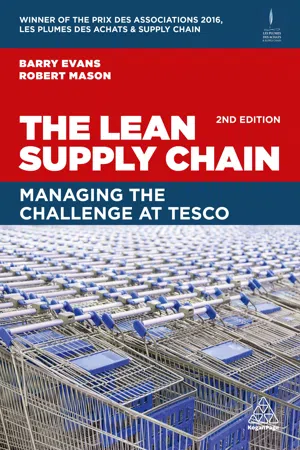
- English
- ePUB (mobile friendly)
- Available on iOS & Android
About this book
WINNER: Les Plumes des Achats 2016 - Prix des Associations (1st edition)
Over the last two decades Tesco has emerged as a dominant player in the UK market and a leading global retailer. The Lean Supply Chain explores how Tesco, over the last 20 years or so, has built its business around supply chain excellence. As a mega-retailer, Tesco has learnt to create a balanced supply chain system, supporting suppliers' needs as well as customers' requirements. This perspective, and an ambition to act sustainably, has underpinned a rebuilding of trust in the Tesco brand and a resurgence in commercial fortunes.
This fully updated edition of The Lean Supply Chain contains new chapters on Tesco's current strategy, rebuilding brand trust and its CSR agenda. It charts the principles of lean thinking, customer loyalty and simplicity which were used by Tesco to frame its supply chain strategy and draws upon the authors' deep knowledge of how the retailer has dealt with challenges and market changes to provide lessons for other businesses, large or small, who wish to place how they manage their supply chains at the heart of their competitive strategy.
Frequently asked questions
- Essential is ideal for learners and professionals who enjoy exploring a wide range of subjects. Access the Essential Library with 800,000+ trusted titles and best-sellers across business, personal growth, and the humanities. Includes unlimited reading time and Standard Read Aloud voice.
- Complete: Perfect for advanced learners and researchers needing full, unrestricted access. Unlock 1.4M+ books across hundreds of subjects, including academic and specialized titles. The Complete Plan also includes advanced features like Premium Read Aloud and Research Assistant.
Please note we cannot support devices running on iOS 13 and Android 7 or earlier. Learn more about using the app.
Information
08
Tesco’s CSR agenda
Introduction
- the CSR agenda as it has developed into general use; and,
- Tesco’s adoption of CSR as a non-financial business driver, and its potential as a proactive business builder.
The evolution of CSR
- Carnegie, who said that ‘the sole purpose of being rich is to be a philanthropist’; and,
- Rosenwald, who believed that ‘you have to be able to do good to do well’. At the time Rosenwald, a firm advocate of the US county farm agent system and infant 4-H clubs, had just purchased a near-bankrupt mail order company – Sears Roebuck!
Table of contents
- List of figures
- List of tables
- Foreword
- The authors
- Preface
- 01 An introduction
- 02 Tesco’s past up to 2014
- 03 The Lewis era: 2014 onwards
- 04 Tesco and strategy: Managing the ‘why, what and how’
- 05 Customer insight, to drive the Tesco supply chain
- 06 Lean thinking and Tesco: Mastering the supply chain
- 07 Tesco and its corporate reputation: Regaining stakeholder trust
- 08 Tesco’s CSR agenda
- 09 Tesco’s seven counter-intuitive beliefs
- 10 Future challenges and principal conclusions
- Glossary
- Index